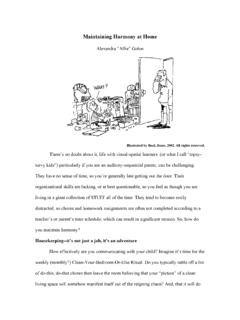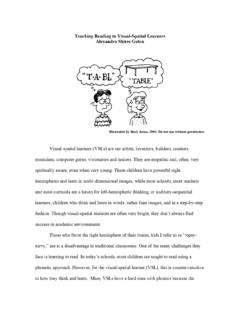Transcription of Utilizing Nature in the Home
1 2018. All rights reserved. 1 Utilizing Nature in the Home Guest: Razi Berry The contents of this presentation are for informational purposes only and are not intended to be a substitute for professional medical advice, diagnosis, or treatment. This presentation does not provide medical advice, diagnosis, or treatment. Always seek the advice of your physician or other qualified health provider with any questions you may have regarding a medical condition. Ryan Sternagel: Welcome back, everyone, to the Toxic Home Transformation. I am Ryan Sternagel of the , the Integrative Answers to Cancer podcast, and the creator of Navigating Childhood Cancer, an integrative coaching program. And we have with us Razi Berry who is the founder and publisher of Naturopathic Doctor News and Review, , and Natural Path, She has spent the last decade as a natural medicine advocate and marketing whiz.
2 She has galvanized the support of the naturopathic community, bringing a higher quality of healthcare to millions of North Americans through her publications. And self-proclaimed health food junkie and mother of two, she loves all things Nature , is obsessed with organic gardening, growing fruit trees, which is not easy in Phoenix I don t think it s easy up here in Utah either. I m going to try my best though when we get into our new house laughing until she snorts, and homeschooling. She is a little bit crunchy. And yes, that is her real name. Razi, good to see your face. How are you? And thanks for coming on the Toxic Home Transformation. Razi Berry: Hi, Ryan. It s great to be here. I haven t heard that bio in awhile. 2018. All rights reserved. 2 Ryan: That s the one I was presented with.
3 Razi: That s great. I love that. That s my favorite. It s the most real. And that s what we re going to do today, get real. Ryan: Get very real. Get very real. Do you still grow fruit trees? Razi: I do. I do. I belong to this Listen to this. It s crazy. So I m in Arizona. And I belong to the Arizona chapter of the California Rare Fruit Growers Society. Ryan: No way. Razi: And it s just a bunch of crazy people that like to try to grow tropical and subtropical fruit trees in the desert. So many of them fail. But the fun part is trying. And I do have a lot of trees on my not-really-large property. I lost my lichen trees this year. I was really sad about that. Ryan: Uh-oh. Yeah, no. Well, I ll have to get some tips on you. And I ll try to one up you by growing fruit trees not only in the desert but in the high mountain desert up here in Park City.
4 So that should be interesting. I don t know. Do they do well in we re building a log house. And it has that classic, great wall of windows right on the front. Razi: Ah, beautiful! Ryan: I was thinking about just seeing if I could get away with some fruit trees right in front of that. I don t know. What do you think? Razi: Well, I m sure you can grow apples and pears and cherries and things like that, I m imagining, depending on how cold it gets. But citrus and all that stuff does great here. But I try to grow things like mangos and papaya, avocados, which really actually the problem here in Phoenix isn t what you d think. It s not the heat. It s that in those other subtropical and tropical climates it doesn't get as cold as it does here. And then for other, like stone fruits, it doesn't get cold enough because you need so many chill hours.
5 So we are in this no man s land. Outside of most citrus, it s really hard. But I do have beautiful pomegranate and fig and every kind of citrus you can imagine, kumquat, limequat, key lime lime, pink grapefruit, yellow grapefruit, blood orange, Cara Cara orange. Those are easy to grow. But I ve got some apple trees, a cherry that doesn't bear very much fruit, plum, mulberry. Lots. 2018. All rights reserved. 3 Ryan: Yeah, all right. Well, you re probably going to be hearing more than you want from me when we get a new house. We have a greenhouse that s waiting to be built. A Geodesic Grow Dome, it s called. So you can actually grow it s made for the mountains, so you can grow year round. And it s heated by a pool inside. So it ll be pretty neat.
6 But enough talking about growing fruit trees in the desert. Before we get into this, do you just want to give everyone we just read your bio but just a little better flavor of anything you d like to add to what it is you would say you do, Razi? Razi: So aside from publishing pretty much the industry trade publication, Naturopathic Doctor News and Review. This is our 14th year of print. It s case studies. And every year we dedicate an entire issue to mind-body medicine which is always our June issue. And it really aligns with the principles of naturopathy. And then I also publish the International Journal of Naturopathic Medicine which has been accepted into three indices where taking those steps, it takes a few years to get into PubMed. I have my own love project that I ve been doing called Love Is Medicine.
7 And I m currently writing a book on that topic. And it s really the convergence of love and relationships and health and how it s biodynamic and interdependent. And our relationships with ourselves, the environment around us which is a lot of what you re talking about in this wonderful summit, and with each other impact our biology, our physiology, our psychology, and our consciousness. So that s where I m geeking out right now. In addition, I also coach some physicians in my Master Mind, a business strategy. So I wear a lot of hats. And I m having fun with all of them. Ryan: So I m in your Love Is Medicine Facebook group. I didn t know you are writing a book called Love Is Medicine. Razi: I don t know if I m going to call it Love Is Medicine, or if the publisher will let me. Ryan: That s a good name.
8 And you post just the most beautiful stuff in there, for lack of a more eloquent term. A little bit of a curveball for you. But just anything offhand, do you have in the spirit of increasing the love in the home from maybe a practical level I imagine I m going to ask you that question, 2018. All rights reserved. 4 and you re going to have something that comes to mind. Yeah, might be an interesting way to start it. Razi: Yeah, love in the home. Well, I m really into this idea of embodiment because we spend so much time in our heads. Even in relationships when challenges come up with our children, with our partner, we do a lot of thinking, ruminating, and also trying to analyze. Is she saying this because she s on her period? Is he doing this because of how his father treated him?
9 Are my kids not getting along because their father and I got divorced? So we spend a lot of time in our heads and not really in our body. And where we love and where we live is in our bodies. All of these chemicals of attachment, whether it s infant and maternal attachment or attachment between two adult partners, we think of that as being in our head or being in our heart. But all of those molecules of emotion are really produced more in our gut and in our heart than they are in our brain. I call it our three hearts the heart here, the heart here, and the heart at our solar plexus. And so it is when you stay present, not in your mind, not mindfulness, but in your body. So for instance, how am I feeling right now? Let s say you walk into your room. And your child s room is a mess. And you notice your chest tightening up.
10 And you re like, Arcadia! And you can just feel. It s always great to stay in your body when you re communicating with people that you love because if you feel tightness somewhere or you feel an unease, it s a good gauge that you re not taking that communication or that dialogue in the right direction. So I think that using your body as a compass for how you interact with each other is probably the best way to take the temperature of a situation. If your body is feeling relaxed, if you re feeling warm, if you re feeling at ease, then chances are you are going to make the right decisions and communicate in healthy ways. That s not to say that uncomfortable emotions won t come up. But you have to really listen in, engage what that feels like in your body. It also is a telltale sign in relationships maybe we shouldn t be in if you have a partner in your life that you always feel stressed or nervous around or self conscious.





